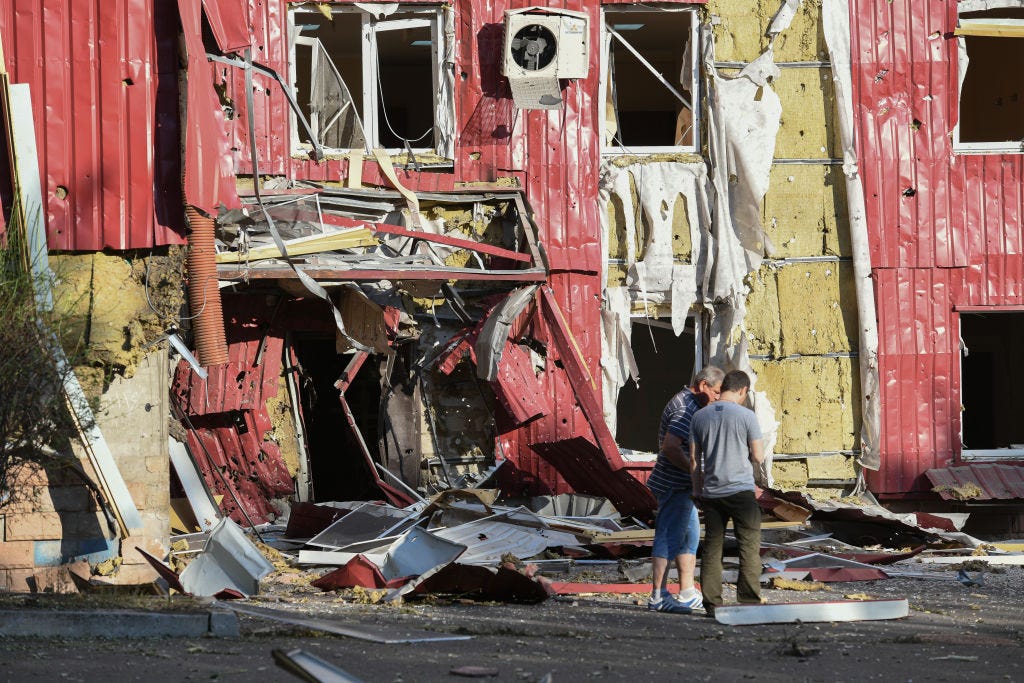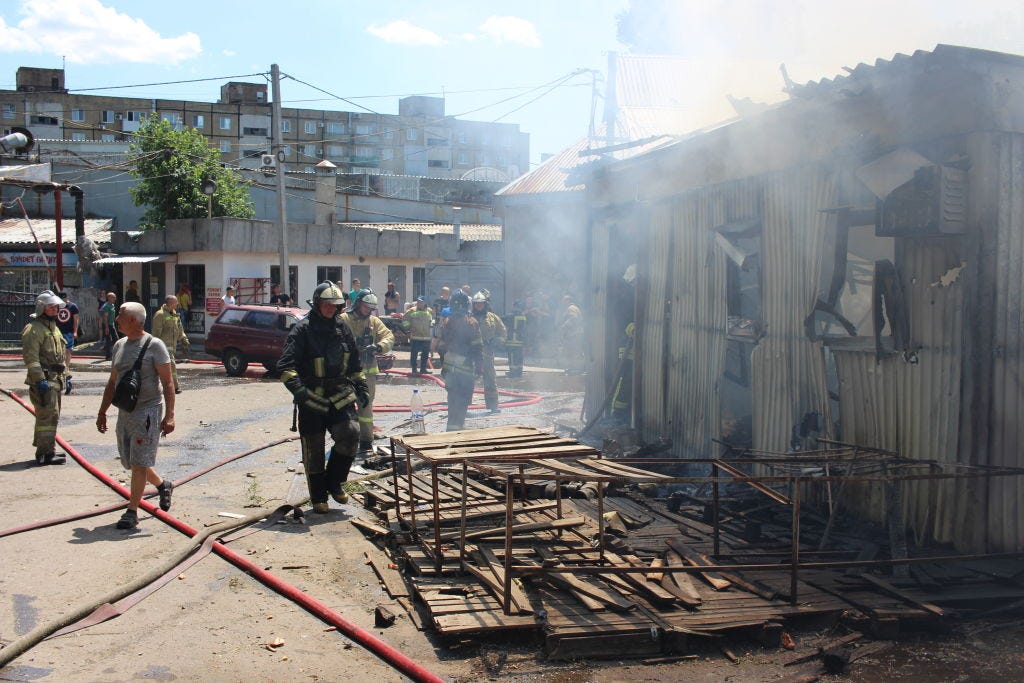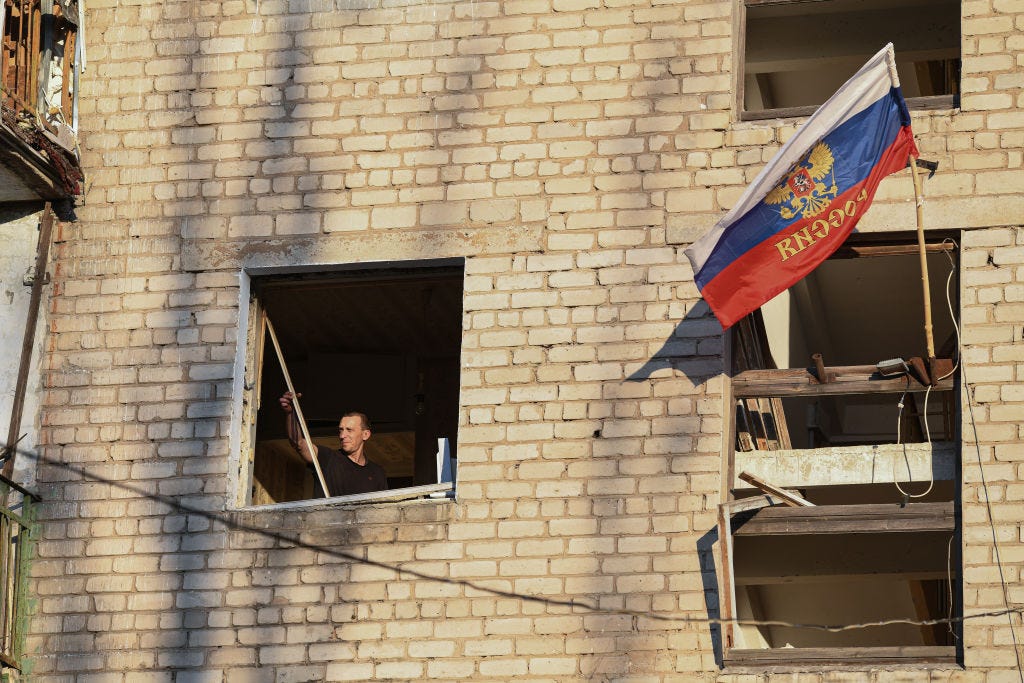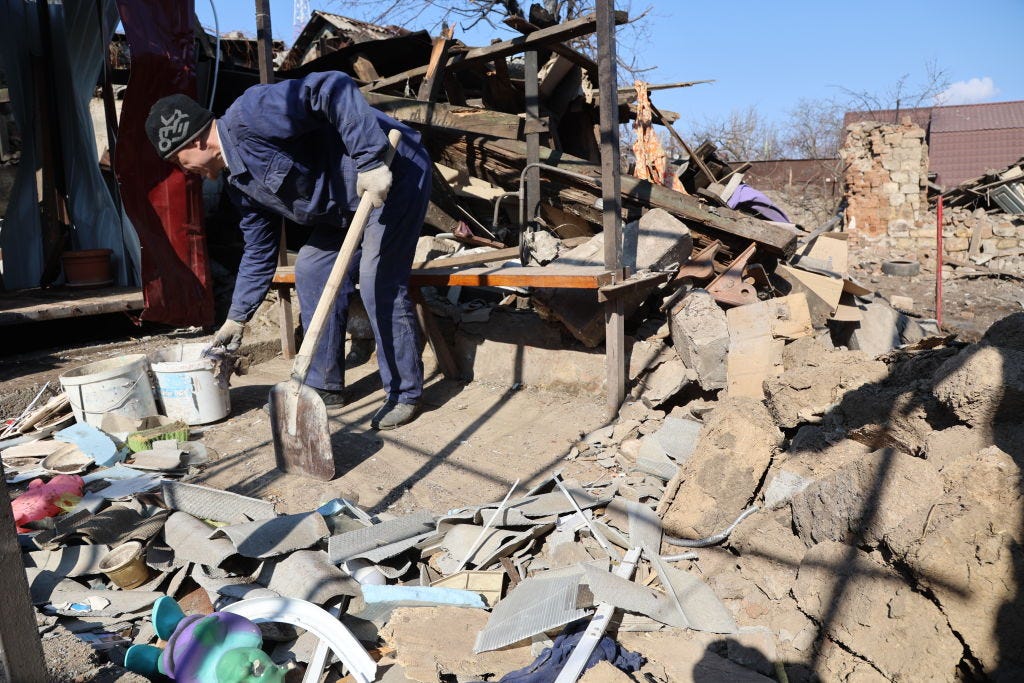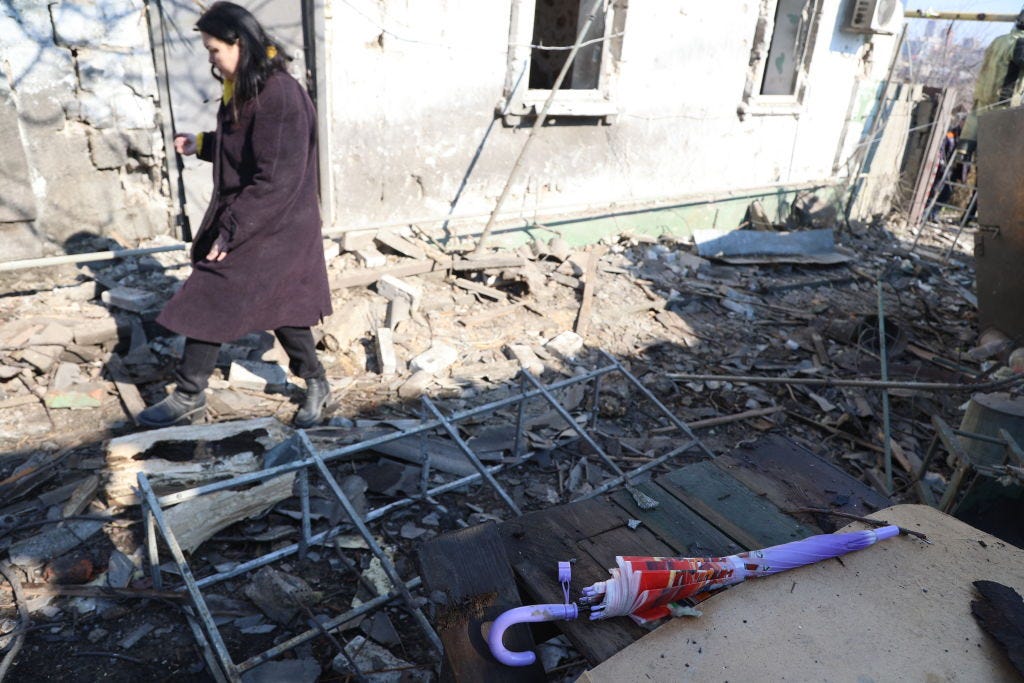A new chapter in an old conflict: what people in Donetsk think about the war
For the residents of Donetsk, 24th February marked a new chapter in a war that had already been part of their lives for a long time.
By Olga Prosvirova and Olga Ivshina
A shop in Donetsk, damaged by shelling. © Getty Images
For the residents of Donetsk, 24th February marked a new chapter in a war that had already been part of their lives for a long time. For them what changed was that the shelling got heavier and more prolonged.
Many people in the ‘Donetsk People’s Republic’ (DPR) were upset to see outsiders mocking the assertation that Russia’s ‘special military operation’ in Ukraine was prompted by “eight years of war” in the Donbas.
Local people who support Ukraine are trying to keep quiet, but those who support Russia are often vocal in their criticism of the way the local separatist authorities are handling the situation, and envious of other towns like Mariupol which they say is getting “all the attention”.
There’s danger everywhere
Nine-year-old Lyosha looks out at the shop windows, sealed over with paper. “Mum, maybe we need something from the shop?”
They don’t need anything from the shop. Things have just quietened down on the street outside, and Lyosha’s mum, Liza*, ignores his questions at first. But Lyosha persists: “Hey, you promised, and it’s gone quiet now.”
Liza sighs. “No, son, you can’t. You promised me you’d read a book instead.”
For the next half hour, Liza listens whilst Lyosha reads a couple of lines to himself in the next bedroom. Then by turn he sighs heavily, has a crying fit, throws his toys around, and then just as quickly calms down, murmuring something under his breath.
“In our family we’ve got a saying – calm mother, calm child,” says Liza. “I’m teaching my son the right way to take cover based on different warning sounds. Before we leave the house, we repeat the safety rules, memorising what he’d do if I lost consciousness. My friends who live in other countries think it sounds awful. But this is just how we keep safe.”
Liza and her son live in the Kyiv district of Donetsk – fairly safe by local standards. Seven years earlier, the active war in the Donbas had become a smouldering conflict, with shells falling less frequently, but remaining an occasional threat.
Throughout the whole period, Russia refused to acknowledge its own role in the conflict, referring only to the will of those who proclaimed “people’s republics” on Ukrainian territory. A significant number of testimonies proved that Moscow directly supported, trained, and armed the separatists. On February 24th 2022, Russia began its full-scale invasion of Ukraine.
Donetsk. Residents near residential building damaged by shelling. © Getty Images
“I stopped watching TV at home back in 2014,” says Liza. “And when I went into work on February 24th, I found my colleagues there, sitting around the screens. What did I feel? Empathy. I’d been through it before, so I had a good understanding of how other people were feeling. By 2022 we had already acquired a lot of experience. On 24th February there were ‘safe zones’ in the town, where shells didn’t fall. There’s nowhere now. Shells fall near neighbouring houses. There’s danger everywhere – in the streets, in the apartments, even in the basements.”
At the end of June, as Liza and Lyosha were making their way home, they came under fire. Shells were falling close to the houses, between the houses, ricocheting from house to house, from one porch to the next. They made it just in time. Shells continued exploding very close to their building. Liza’s first thought was to wait out the bombardment in the corridor by the load-bearing wall, but hunger intervened.
With rumbling outside the windows, Liza and Lyosha took what they found in the fridge, and kneaded the dough for a pie. They slept on the living-room sofa – it was closer to the corridor. Shells were falling all through the night. Liza and Lyosha buried their heads under a blanket and slept.
Liza doesn’t like following the news on social media or listening out for sound of shellfire. She tries to keep focussed on everyday life – the flat needs cleaning, the kitchen walls need decorating, a length of fabric – bought long ago – is lying waiting for Liza to get to the sewing machine.
Liza barely notices the falling shells, and mentions them casually, as a part of everyday life.
“Compared to how it was before – shelling lasting eight hours, everything flying around and exploding, the whole house shaking, furniture jumping … a lone shell doesn’t bother me.”
Above all, Liza worries for her son. “There’s no way that what’s happening isn’t affecting the mental state of our children – their health, their development, how they see the world as a whole. Tantrums, wetting themselves, fainting – the kinds of reactions that make your blood run cold. I understand that the full consequences aren’t here yet, that we’ll still have to deal with them.”
“I can’t cope”
When the full-scale war began, Russia had the advantage in the Donbas – military forces advanced from several directions at once: one from the east, another from north to south from Donetsk, and the third from Crimea. These forces were moving towards each other and trying to close the gap. In the south they were successful, and so they took Mariupol. Now Russian troops and separatists are moving north – the fighting is heaviest in the area of Bakhmut, a city 110 kilometres from Donetsk. Military experts predict that the Russian army will soon focus its main efforts on capturing Sloviansk and Kramatorsk - the major cities of the Donetsk region that they don’t control.
In the middle of May, 8-year old Sasha* was on his way to school, carrying his homework. It was a peaceful, sunny morning. War planes appeared from nowhere and the shelling began.
Sasha fell to the ground and couldn’t move. He’s hardly spoken a word since.
Back in 2014 when the active conflict in the Donbas began, Sasha was still a baby. In the following years his region was not under fire.
Sasha’s 17-year old sister, Ksiusha*, looks after him and their two sisters whilst their mother works in a shop. Ksiusha is glad that their small, private house on the outskirts of Donetsk has a cellar. Since February, Ksiusha has been taking her siblings down there, keeping them calm, and doing homework. But she’s feeling the strain.
Donetsk. A market on fire after shelling. © Getty Images
“I’m no good at this,” she says. “I can’t cope.”
“Remote learning for children began two years ago, because of Covid. But it never ended for the kids in our cities,” says another local resident, Natalya.
“Of course the actions of the military affect them. Childhood was stolen from our children. It’s not normal for children to live in shelled cities, with shell casings for toys, making fences with them for their little sand houses. It’s not normal when children study under shellfire, and it’s not normal when their schools are bombed.”
Ksiusha and Sasha’s house has no water. When the water is switched on again for short periods, a dark brown, foul-smelling jet comes out of the tap.
In many areas of the city the hot water and heating were switched off in March. The cold water disappeared a month ago. Locals are already worrying about what will happen in the autumn. If the water supply is not fixed, there will be no heating.
For Ksiusha this is at least one thing she doesn’t have to worry about because there’s an old-fashioned stove in her home.
But water remains a problem for everyone.
Most of the drinking water in Donetsk has to be bought. Until 24th February, water cost 1.5 roubles a litre, whereas it now costs 4 [about 58p]. When the shelling stops, Ksiusha and her mother and the other children sometimes go to get water from a nearby spring.
“We’re managing with the water, because there’s a kind of make-shift schedule,” says another Donetsk resident, Anna, who works as a copywriter. “People fetch water, they buy drinking water, and also go to special distribution points for industrial water. Work is underway on an extra water pipeline.”
Donetsk. June 2022. Residential builsing damaged after shelling. © Getty Images
Anna says Donetsk is divided – one area has light, water, and gas – whilst another has nothing.
“In Petrovsky district – on the front line, there’s no shortage of food, but constant outages of electricity, gas, and no phone signal,” she says. “The village of Trudovskaya has gone without light, gas, phone signal, and water for ages. Volunteers are helping the people there, risking their lives. At the same time, Voroshilovsky district has water pretty much around the clock, they have electricity, gas and internet. Our services here are working well, because they are fixed quickly even after a period of shelling.”
“We’re patient, there’s no other way to say it”
Petrovsky district – the furthest from the centre of Donetsk – is one of the most turbulent. There are several mines here – some working, some long-since abandoned. A few factories remain. Locals generally live in private homes [and not high-rise blocks].
Listening to the official Russian news, one often hears that Ukrainian troops are constantly shelling Petrovsk.
“Yeah, those ‘DPR’ guys will come and say, “They’re about to fire at you, get in the shelter,” one local woman tells the BBC. She asks for her name to be withheld because she supports Ukraine. “And it’s they themselves who are deploying their military hardware. No wonder there’s shooting.”
If there’s shooting in the city, many locals believe that Ukraine is shelling them. But it’s not always possible to pinpoint exactly where a shell has come from. After the Organisation for Security and Co-operation in Europe (OSCE) mission left Donetsk, no independent experts remained.
Donetsk. April 2022. A man checks his house damaged by shelling. © Getty Images
In several cases of mortar attacks, people in Donetsk have said they heard mortar volleys, with explosions following a few seconds later.
In one report that attracted much attention, a correspondent for the Russian newspaper ‘Izvestia’ said several times that there was a three-second gap between the sound of the initial shot and the explosion. A mortar’s firing-range is between six and seven kilometres; the Ukrainian army’s front flank is the same distance from Donetsk. However, a shell takes 12 seconds to cross this distance (or slightly more, depending on the trajectory.) In cases where there are only two or three seconds between shot and explosion, experts doubt the ‘DPR’ authorities’ assertions that the shell could have reached Donetsk from the Ukrainian positions.
Aleksandra lives in the besieged Petrovsky district. She confirms that the situation is now much more serious than it was during the worst of 2014.
“In the last eight years of my life here, I’ve never experienced such horror,” she says.
“They’ve started shelling more often, more fiercely, and without mercy. Everyone here just hopes it will come to an end eventually. Since there’s so little we can do about it, we can only endure. We’re patient – there’s no other way of putting it. Sure, in 2014 and 2015 there was shelling, but it was nowhere near as intense or prolonged. Life has been quiet here since 2016. They’d start firing somewhere so far away that I couldn’t even tell where they were. We lived just as before, before the war. Now the situation is stretched to its limits, ordinary people are killed every day. And now it doesn’t make a difference whether you’re in the city centre or the outskirts.”
Aleksandra criticises the self-proclaimed authorities of the ‘Donetsk People’s Republic.’ She says that they promised to sound sirens, warning of impending shellfire, but she’s never once heard a siren used. Over the last few years locals have trained themselves to judge by ear whether a volley is incoming or outgoing.
Aleksandra complains that the authorities took no care of electricity substations or drinking-water tanks: "If the authorities had listened to people, everything would have been different. The people’s voice will never be heard here."
Despite her dissatisfaction with the ‘DPR’ leaders, Aleksandra still warmly supports the Russian army. Ukrainian television has not worked in the separatist-controlled territories for some time, Russian channels are available to watch from dawn till dusk. Aleksandra repeats their narrative.
“My aunt who lives in Ukraine tells me they [Ukrainians], can’t be firing at their own people,” says Aleksandra, throwing up her hands.
“Well, a lot of people here feel sorry for the Ukrainians, because they don’t know the truth about what’s happening. Donetsk is closer to Russia now. If it hadn’t been for Russia, nobody knows how long this ‘frozen’ war – up until February 24th – would have lasted. I think that Russia saw there was no point adding fuel to the fire. After a while, seeing as Ukraine wasn’t getting any more common sense – they couldn’t come to an agreement after eight years, plus they were going to attack us – Russia decided: well, how many more of these meaningless agreements on negotiations can we take? If Russia had not backed the ‘DPR’, I think it would have been much worse."
When asked why she believes that Ukraine "couldn’t come to an agreement" and "was about to attack," Aleksandra does not even want to answer - it seems obvious to her, because that’s what they said on TV.
Denis Pushilin, self-styled head of “Donetsk People’s Republic”. (C) Getty Images
Not everyone in the Donetsk thinks this way. Many are baffled: why did Russia want to ‘liberate the Donbas’ – and then bomb Kyiv and Odesa? A lot of men are hiding from forced conscription – not even those who are against Ukraine want to go and fight near Mariupol.
Artem hasn’t left his house for several months, after witnessing ‘DPR’ officials flagging down a minibus, forcing the passengers onto the street, and trying to take the driver to the frontline. “The passengers only just managed to get that bus back,” says Artem.
Aleksandra has no problem with forced conscription. “Well, who’s going to defend the motherland, if not the people? You either die for the motherland, or you get killed. These days, a lot of guys talk a lot and do very little. And then they go on social media and start calling for liberation. Who is going to be liberated? Surely Russian women wouldn’t want to send their men into a war that’s nothing to do with them. No, of course not. But Russia still came to help us, sent their troops, their people, they didn’t ditch us.”
The training and equipment of the Donetsk and Luhansk military raises further questions. When full-scale hostilities began, it turned out that many units - contrary to promises and reports – were low on equipment and personnel. There wasn’t even enough equipment for those who signed a contract for service extending to 24th February. The soldiers were generally issued with 1960s helmets and old berets, and sent straight to the front after three or four days of training.
There are rumours in Donetsk of huge losses amongst the military of the self-styled republics. It’s difficult to confirm or refute this information. British intelligence believes that more than half of the original ‘DPR People’s Militia’ were killed or wounded. Before the war, there were between 20,000 and 25,000 soldiers in the ‘DPR’ forces.
"Of course we have sympathy for the ordinary people caught up in this meat grinder,” says Anna.
“But there was one moment after 24th February that shocked us: the Ukrainians said that a war had begun. We asked the logical question: well, what was happening before that? The well-known phrase ‘eight years of war’ was ridiculed, the deaths of people here and there were actively compared – people said that we hadn’t had such heavy bombardment. The Donbas was very offended by this level of indifference on the part of our former compatriots. I say “former,” because let me tell you, after the stream of hatred we got from them, I don’t want any more to do with these people.”
Donetsk. April 2022. A woman passes building damaged by shelling. © Getty Images
According to authorities in the ‘DPR’ and ‘LPR’, eight civilians died from shelling on the territory of the self-proclaimed republics in 2021.
Comparing life in the Donetsk with the situation in the new occupied territories is now a favourite pastime of the residents here.
Aleksandra from Petrovsky district is envious of the fact that Russian passports have been issued swiftly in the cities and regions captured by the Russians – Kherson, and Zaporizhia oblast. Aleksandra herself got a Russian passport several years ago, after months of gathering documents, standing in queues, and travelling to Russia. “There are so many injustices in this regard,” she believes.
Oksana, a baker from Donetsk, was outraged that conscripted local men left to fight in Kherson, Mariupol and Kharkiv, whilst Donetsk itself was still under fire. She is convinced that pro-Russian forces had their chance to “liberate” – that is, capture – these territories back in 2014. For some reason, complains Oksana, “they gave Ukraine seven years to prepare and completely entrench themselves.”
The behaviour of Donetsk politicians also raises questions for some people.
“Is Pushilin leading by example? If he’s the commander, where is he?” Oksana wants to know. [Pushilin is the head of the ‘DPR’] “Why hasn’t the governor of the republic made any appeals to the people? They’re completely flattening us out here, whilst he’s hiding behind a cannon in St. Petersburg. The government and their parasites are thriving, whilst the people are scarcely hanging on. Pushilin’s daughter is in Dubai. And they are still refusing to pay to treat wounded conscripts. If I left, I’d lose my job. Living alone in Russia with a child in second-grade and my job – now that would be a bitter pleasure. Russian bureaucracy is notorious, you can’t get to the doctor. I can’t afford my initial mortgage payment, I’m so scared about the future.”
Aleksandra echoes this view. “Why is life getting better in Mariupol, while people are still dying in my home town?”
School teacher Natalya also believes that “life in Mariupol is now a bit better than in Donetsk. “They’re getting all the help and the attention. Nobody cares that Donetsk is on fire.”
The idea that ‘life is improving’ in Mariupol is regularly repeated by Russian television. Nonetheless, there are still major problems with food, water, medicine, heating, and electricity in the city. And according to the Ukrainian authorities, 90 percent of Mariupol has been obliterated – there are practically no undamaged buildings left standing in the city.
Ukraine believes that there are between 100,000 and 120,000 people still living in destroyed Mariupol – just a fifth of the original population. Ukrainian bureaucrats say that Russia is demolishing many of the damaged houses, in which the dead may be lying. Mobile televisions have appeared on the city streets, broadcasting all the Russian channels. The residents of other occupied cities said that any opposition to the new authorities is being ruthlessly suppressed.
“It’s thought that two months of sheer hell, like Mariupol, couldn’t be compared to anything,” says Anna. “But you can imagine what it’s like when you live in a state of war for several years – then there’s a lull, you get used to peace – and then, bang! The fighting resumes. And it offended us that voices from Mariupol were heard all over the world, and in all the media – whilst we are still getting shelled behind the information curtain.”
Start with yourself
Dmitry* lived in Donetsk for 29 years, and now likes to say: “If I hadn’t seen what Donetsk was like before the war, perhaps I would have understood everything differently. But I believe that development peaked in the period before 2014. There were loads of industries in the city, the mines were still open. Salaries were decent. My pal earned 20,000 hryvnias [around 2500 dollars in 2013, BBC] on top of his existing pension – another thousand dollars. Generally, people weren’t suffering.”
In spring 2014, the so called ‘People’s Militia of Donbass’ stormed the administrative building, flew the Russian flag from the roof, and demanded an independence referendum. A little-known activist named Pavel Gubarev became the governor.
Dmitry recalls how the supporters of independence gathered for a rally in Donetsk. “There were loads of people standing around with different flags – everything from the old USSR flag to the Cossack one, “The Omnipotent Don Army.” It was a real hodgepodge. On a makeshift stage [the rebels] were shouting: “Who shall we choose as governor of the people?” And people started chanting, Gu-bar-еv, Gu-bar-еv!” I turn to a woman close by me, and I say: “Hey, do you know who this Gubarev is?” And she says, “Well, do you want the Banderites to turn up instead?” After that, everything was clear to me.”
“From the moment when the USSR collapsed, people have been going on about the theory that eastern Ukraine feeds the west. The westerners don’t want to work, they’ve always hated us, and our granddads fought with Bandera – that kind of stuff. The degree of rejection of western Ukraine has always been high, for as long as I can remember,” says Dmitry.
Dmitry describes today’s Donetsk as a ‘dismal, grey’ city. He remembers going out in his car one day and seeing the Soviet red star – planted on the crossroads where an ordinary billboard once stood. “They [the self-styled leaders of the city] don’t even try to hide their love for the Soviet Union. The symbols are everywhere, they’ve even put a Stalin monument on the separatist territory.”
Dmitry’s family had an immediate, negative reaction to the ‘authorities’ of the so-called DPR. But others felt differently.
Artem’s cousin went as far as joining the separatist forces. “He said that fascists had come to kill us,” he says. “I didn't really understand politics at that time, but even I knew intuitively that something was wrong here. It shocked me how aggressively he tried to convince me that I should hate Ukraine."
Dmitry can’t restrain himself when he reads comments about ‘eight years’ on social media.
“That stuff is straight out of the training manual.,” he says. “There was localised bombing in Donetsk, but practically nothing in the city centre. We even had parades, holidays. If the city was really under blockade – as they’re always shouting that it was, there’s no way we’d have had New Years shows and Gazmanov concerts.” [Oleg Gazmanov is a popular Russian singer.]
“There are a lot of people in Donetsk who support the Ukrainian position,” says one man, who asked the BBC for anonymity. “All these people believe it is dangerous to discuss their opinions, even amongst friends.”
But others are waiting eagerly to become part of Russia.
“The people who stayed in Donetsk have a shared vision of the future,” says Anna. “Not everyone understands that we’ll become part of Russia. Not everyone likes it, some want peace and don’t care which flag we’re under, but most of the population is happy to become Russian, because nothing can make up for the way we were betrayed by Ukraine.”
It was almost noon when Liza, Lyosha’s mother, woke up at the weekend. Moral fatigue affects us all, she says. She then rushed around the area, looking for drinking water. She was only able to find a single 1.5 litre bottle. “I’ll think of something tomorrow,” says Liza, calmly.
Whilst she was searching for water, she discovered that there was cash at the ATM, which usually has a sign on it saying ‘no money’.
“Nothing has changed for me personally since 24th February,” Liza says. “I still go to work, raise my child, enjoy each passing day, pray I’ll see the next sunrise and admire the sunset. I really want to live. I believe in kindness, and I know for sure that you have to start with yourself. Anger, spite and hatred – these are the things that quietly and inextricably destroy a person from within.”
*The names of some protagonists have been changed at their request.
Translated by Pippa Crawford.
You can read this story in Russian here.





